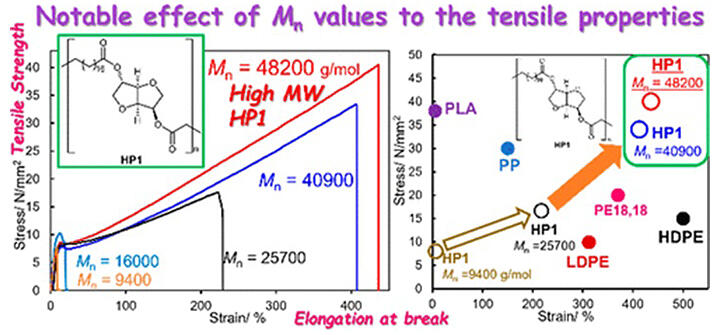A research group led by Professor Kotohiro Nomura of the Graduate School of Science at Tokyo Metropolitan University (TMU), in collaboration with a research team led by General Manager Hiroshi Hirano of the Research Division of Materials Science and Engineering at the Morinomiya Center of the Osaka Institute of Industrial Science and Technology (ORIST), has developed a biobased polyester from inedible plant resources that is not only degradable and recyclable but also more flexible and stronger than conventional plastics. The results have been published online in the October 4, 2023 issue of ACS Macro Letters.

DOI: 10.1021/acsmacrolett.3c00481. CC by 4.0
Biobased polyesters derived from long-chain fatty-acid esters such as vegetable oils are attracting attention as sustainable materials for the realization of a circular economy. Although cases of materials with mechanical properties (e.g., tensile strength and elongation at break) comparable to those of general-purpose plastics such as polyethylene and polypropylene have been reported, few examples of the development of high-performance materials that take advantage of these properties are available.
These polymers are obtained via the polycondensation reaction of dicarboxylic acids with diols and the metathesis polymerization of olefins. In particular, the polymerization method is expected to allow for a wide range of molecular designs. However, synthesizing the high-molecular-weight polymers needed for film fabrication using conventional methods is extremely challenging.
Due to this, the research group has focused on developing a method that enables the synthesis of polymers with molecular weights higher than those obtained through conventional methods by performing reactions in ionic liquids as well as simpler and higher-molecular-weight materials.
In this study, the feasibility of molybdenum-catalyzed olefin metathesis polymerization for the synthesis of biobased polyesters consisting of symmetric repeating units derived from vegetable oils and glucose was investigated.
The results revealed the possibility of synthesizing polymers with molecular weights (approximately 50,000) higher than those obtained using conventional ruthenium-catalyzed methods.
In contrast to the general trend observed for this type of polymer, the polymer films prepared by the heat/pressure method in this study showed increases in tensile strength and elongation at break with increasing molecular weight. Thus, developing materials with elongation at break and strength greater than those of general-purpose plastics is now possible. The newly developed biomass-based plastic is degradable and chemically recyclable. It consists of symmetrical repeating units that promote interactions between polymer chains.
The wide range of raw materials that can be used allows for a wider range of molecular designs, and the simplicity of the reaction also enables the scaling-up of the catalyst for mass synthesis. In addition, composites with cellulose nanofibers and other naturally derived fibers can be used to increase strength.
Journal Information
Publication: ACS Macro Letters
Title: Synthesis of High Molecular Weight Biobased Aliphatic Polyesters Exhibiting Tensile Properties Beyond Polyethylene
DOI: 10.1021/acsmacrolett.3c00481
This article has been translated by JST with permission from The Science News Ltd. (https://sci-news.co.jp/). Unauthorized reproduction of the article and photographs is prohibited.




